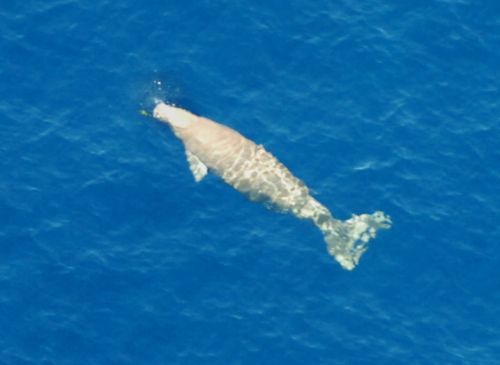Henoko Environmental Oversight Committee specialist says Okinawa dugong is “highly likely extinct”; large-scale survey needed

October 13, 2019 Ryukyu Shimpo
The Ryukyu Shimpo learned that at a meeting of the Environmental Oversight Committee held by the Okinawa Defense Bureau in September regarding the construction of a new military base in Henoko, Nago, one of the committee members stated that the dugongs that have been sighted in the waters around Okinawa Island, including around the base construction site, are “highly likely extinct.” Meanwhile, experts concerned about the impact that the new base construction will have on the dugong’s habitat say that a large-scale survey must be conducted before determining that the dugong is extinct, and offer the critique that the new base construction work should be suspended in order to verify a causal relationship with the construction.
The comment in question was made at the 21st meeting of the Environmental Oversight Committee held on September 9. According to minutes of the meeting disclosed by the Defense Bureau, a member stated, with regard to the fact that the two dugongs called “Specimen A” and “Specimen C” have been unaccounted for since the new base construction started, “I believe it is highly likely that they are extinct, but I think a large-scale survey could be performed to verify whether that is the case.”
Another committee member mentioned the possibility that Specimen A and Specimen C had moved to a different area of the ocean, and said that a large-scale survey would be necessary for identification. The Defense Bureau expressed opposition to the idea of a large-scale survey.
“It’s certainly true that the dugongs around Okinawa face the threat of extinction” said Hideki Yoshikawa of the Save the Dugong Campaign Center. “That’s precisely why the government should suspend the construction for two or three years to see if the dugongs come back.”
“Japan’s environmental administration should do their utmost to verify whether Specimen A and Specimen C are still alive,” said Mariko Abe of the Nature Conservation Society of Japan, calling on the Ministry of the Environment to perform a large-scale survey.
(English translation by T&CT and Sandi Aritza)
Previous Article:Rope breaks for the first time at annual Great Tug-of-War
Next Article:With an eye towards the future, the Asian Women Social Entrepreneur Network hosts a summit in Naha
[Similar Articles]
- ODB recorded call from heretofore unidentified dugong in waters surrounding Henoko in August
- Two missing dugongs may substantiate OPG claim that Henoko construction harms environment
- Dugong survey fails to confirm that dugong still inhabit ocean around Okinawa Island
- One of only three Okinawa dugong specimens found dead, whereabouts of other two unknown
- In March, sounds appearing to be dugong calls recorded 23 times total, rare coral also found
 Webcam(Kokusai Street)
Webcam(Kokusai Street)


